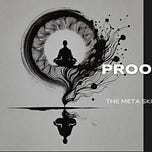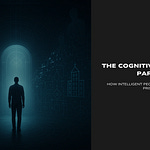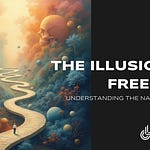The World of Tomorrow
If I had absolute certainty about how the world will change in the next 5 years, I wouldn't be optimizing for today. I'd be positioning myself for the inevitable future - because the people who thrive are not the ones who react to the change, but the ones who see ahead and prepare accordingly.
The next 5 years will be the most disruptive period of our lifetime. AI will rewrite the rules of work. Entire industries will shift. Traditional career paths will collapse.
But while technology is evolving at breakneck speed, human nature is not.
This means the real competitive advantage isn't just learning AI tools - it's developing the core skills that will make you indispensable no matter how the world changes.
The ability to run thought experiments about our near future isn't just for futurists or technologists - I believe it is a skill for everyone navigating this rapidly changing world. By projecting ourselves just 5 years ahead and asking "What will happen? What will change? How must I adapt?", we can prepare ourselves to be ready for the world of tomorrow.
This isn't a speculation for entertainment purposes. It's being strategic. And it's something we all can - and probably must - develop.
The Economic Reality of 2025-2030: Why Future-Proofing Matters
By 2030, here's what will be true:
AI will automate the bottom layers of knowledge work. If your job is based on processing information in predictable ways, AI will do it faster, better, and cheaper. This isn't speculation - it's already happening. The difference is that by 2030, this transition will be complete.
The gap between AI-augmented and AI-resistant individuals will widen. You'll either master AI and use it as leverage - or you'll be competing against people who do. Those who embrace AI as a collaborator will outperform those who either ignore it or view it as competition.
Human skills will become more valuable, not less. AI will flood the world with data, options, and generic content - but real decision-making, creativity, and emotional intelligence will become the scarcest (and most valuable) assets. In a world where anyone can generate content or analysis at scale, the premium shifts to discernment and wisdom.
The winners will be those who build adaptability, self-awareness, and intelligence across multiple domains. AI will not save you from stress, uncertainty, or an identity crisis. Only deep inner intelligence - true self-awareness - will allow you to navigate a rapidly changing world without losing your edge.
This is a hard truth we all need to swallow: most careers that exist today will be fundamentally transformed within 5 years. This isn't just about AI replacing jobs - it's about the nature of work itself evolving.
Consider these realities:
Middle-skill knowledge work is the most vulnerable. If your job involves following procedures, analyzing structured data, or producing standardized content, AI is already capable of doing 80% of it. By 2027, that number will approach 95%.
Credentials are losing value. Having a degree or certification matters less than what you can actually do. The market is shifting toward skills and results rather than pedigree.
The half-life of technical skills is shortening. What took you years to learn may become obsolete in months. In tech fields especially, expertise has an expiration date.
This is a scary thought but it hides the opportunity: when everything changes, adaptability becomes the ultimate advantage. Those who can navigate uncertainty and continuously evolve will have a chance to thrive in this new world.
The Future of Work
Now, let's apply our thought experiment to the world of work. Which professions face disruption? Which might prove more resilient? And what does this tell us about the skills that will remain valuable?
Professions Facing Major Disruption
Content Production: Writing, editing, translation, and basic creative work will be increasingly automated. AI can already produce content that passes for human-written in many contexts.
Routine Knowledge Work: Data analysis, research compilation, basic legal work, and administrative tasks are prime candidates for automation.
Programming and Software Development: While not eliminating the field, AI coding assistants will transform how software is written, reducing the demand for programmers who simply implement specifications.
Customer Service: AI-powered conversational agents will handle an increasing percentage of customer interactions.
Basic Creative Work: Logo design, stock photography, background music, and other "template-driven" creative outputs will be largely AI-generated.
Professions with Moderate Disruption Risk
Medicine: While diagnostic and analytical aspects may be automated, the human elements of healthcare will remain essential.
Education: AI will transform content delivery, but the coaching, mentoring, and inspirational aspects of education will still require a human touch.
Management: AI will handle more analytics and reporting but strategic leadership will still require human judgment.
Specialized Design: Creative work that requires a deep understanding of human needs, emotions, and cultural context will be augmented rather than replaced.
Professions with Minimal Disruption Risk
Leadership Roles: Positions requiring vision-setting, ethical decision-making, and inspiring others will remain human-centred.
Therapeutic Professions: Counseling, coaching, and other roles centred on human connection and emotional support will be enhanced by AI but not replaced.
Complex Creative Direction: Roles requiring the orchestration of diverse talents toward a unified vision will still need human direction.
Philosophy and Ethics Work: As AI raises profound questions about our future, those skilled in ethical reasoning will be increasingly valuable.
Spiritual Guidance: As technology transforms our world, the hunger for meaning and transcendence will only grow.
The Emerging Pattern: Meta Skills as the Key to Future-Proofing
Looking at the professions with minimal disruption risk, a pattern emerges. These roles aren't protected because they're technically difficult for AI to perform, but because they require something fundamentally human: meta-cognitive skills that transcend specific domains of knowledge.
These meta-skills that apply across contexts and enhance our application of other skills will be the foundation of future-proof careers and lives.
To become truly antifragile in the age of advancing AI, we need to develop a comprehensive portfolio of meta-skills that allow us to build ourselves by design.
Metacognition: The Master Skill
At the heart of these meta-skills lies metacognition - the ability to think about your own thinking. It's not just another skill but the master capability that enhances all others.
What Is Metacognition?
Metacognition is your mind observing itself. It's the capacity to:
Monitor your thought patterns, learning habits, and cognitive processes
Evaluate the effectiveness of your thinking approaches
Regulate your cognitive processes to optimize performance
Control attention, select strategies, and allocate mental resources
Think of metacognition as your mind's operating system. While regular cognition processes information, metacognition oversees how that processing happens. It's the difference between solving a problem and understanding how you solve problems.
Why Metacognition Matters in the AI Era
As AI takes over routine cognitive tasks, metacognition becomes the key differentiator between human and machine intelligence. AI can process information and make predictions, but it cannot truly reflect on its own processing or understand itself.
Metacognition enables you to:
Recognize when AI tools should be deployed and when human judgment is needed
Identify your cognitive blind spots and biases that might affect your work with AI
Adapt your thinking strategies as situations change
Integrate insights across domains in ways AI cannot
Transfer learning from one knowledge domain to an entirely different context
In essence, while AI excels at specific cognitive tasks, metacognition allows you to orchestrate multiple forms of intelligence - both human and artificial - toward complex goals.
How to Develop Metacognitive Skills
Unlike technical skills that can be acquired through traditional learning, metacognition requires deliberate practice of self-awareness:
Reflective Journaling: Regularly document not just what you learned or did, but how you approached problems, what strategies worked, and what didn't.
Strategic Questioning: Ask yourself process-oriented questions like "How am I approaching this?" "What assumptions am I making?" "What alternative strategies could I try?"
Feedback Analysis: After completing tasks or projects, analyze not just the outcome but the thought processes that led to it. What mental models guided your decisions?
Meditation Practices: Regular Zen meditation strengthens your ability to observe thoughts without immediately reacting to them.
Thinking Partnerships: Engage with others who can help you see your thinking patterns from the outside and challenge your assumptions.
Mental Model Expansion: Deliberately learn frameworks from diverse disciplines to expand your repertoire of thinking tools.
The most powerful metacognitive practice combines all of these: deliberately tackling unfamiliar problems, carefully monitoring your thought processes, reflecting afterward on your approach, and gradually building a personal system for thinking that transcends specific domains.
What Metacognition Enables
Developed metacognition fundamentally transforms your relationship with knowledge and learning:
Radical Adaptability: You can adjust your thinking strategies as contexts change, making you resilient to disruption.
Accelerated Learning: You become more efficient at acquiring new skills because you understand how you learn best.
Enhanced Creativity: You can combine ideas across domains by recognizing patterns in your own thinking.
Superior Decision-Making: You recognize cognitive biases before they lead to poor choices.
Social Intelligence: You understand both your own thinking and others', allowing for true cognitive synergy.
AI Augmentation: You know precisely when and how to deploy AI tools to extend your capabilities.
Metacognition skills enable you to change the very relationship you have with thinking, which may be the most distinctly human capability of all.
Meta Skills for the AI Era
Let's explore the other crucial meta-skills for the AI era that build upon metacognitive awareness:
1. Self-Awareness: The Foundation of All Meta Skills
Self-awareness - the capacity to observe our own thoughts, emotions, and behaviours with clarity and without judgment - isn't just a psychological nice-to-have. It's the fundamental meta-skill upon which all others are built.
AI systems, no matter how advanced, lack consciousness and the ability to reflect on their own functioning in the way humans can. They process information without awareness of themselves as processors. This creates a fundamental limitation that human consciousness can transcend.
By developing deep self-awareness, we gain the ability to:
Recognize our cognitive biases and compensate for them
Understand our emotional responses and their impact on our thinking
Identify our strengths and limitations accurately
Monitor our own learning and adapt our approaches
These capabilities allow us to navigate complexity in ways algorithms cannot, precisely because algorithms cannot "step outside" their own systems and reflect on them. Humans can.
2. Emotional Intelligence: The Human Connection
Emotional intelligence - understanding and managing our own emotions while skillfully navigating the emotions of others - will become increasingly valuable as technical tasks are automated.
Components of emotional intelligence include:
Emotional self-awareness: Recognizing your own emotional states and their effects
Emotional self-regulation: Managing disruptive or unhelpful emotional responses
Emotional Empathy: Sensing and understanding others' emotions and perspectives
Social skills: Building rapport, managing conflict, and inspiring others
While AI can simulate some aspects of emotional intelligence, it cannot authentically experience or deeply understand emotions. This creates a domain where human capabilities remain uniquely valuable.
3. Social Intelligence: The Coordination of Minds
Beyond emotional intelligence lies social intelligence - the ability to navigate complex social environments, build relationships, understand group dynamics, and coordinate collective action.
As AI handles more independent tasks, the value of human collaboration will increase. Those who can:
Build trust across diverse groups
Navigate cultural differences
Facilitate effective collaboration
Resolve conflicts constructively
Inspire collective action toward shared goals
will find themselves increasingly valuable in an AI-saturated world.
4. Cognitive Flexibility: The Adaptable Mind
The ability to shift thinking strategies, adapt to new information, and operate across multiple domains of knowledge will be essential in a rapidly changing environment.
Cognitive flexibility includes:
Mental model switching: Moving between different frameworks for understanding problems
Cross-domain thinking: Applying insights from one field to problems in another
Paradigm questioning: Challenging fundamental assumptions about how things work
Contradictory integration: Holding seemingly opposing ideas and finding their synthesis
As AI excels at optimization within known parameters, humans with cognitive flexibility will excel at questioning those parameters and imagining alternatives.
5. Spiritual Intelligence: The Quest for Meaning
Perhaps the most overlooked meta-skill is spiritual intelligence - the capacity to contemplate existential questions, connect with transcendent values, and find meaning beyond material success.
As AI takes over more routine aspects of work and life, questions of meaning, purpose, and value will become more, not less, important. Those who can:
Connect daily actions to deeper purposes
Navigate existential challenges
Find meaning in uncertainty and change
Access wisdom beyond rational calculation
Cultivate a sense of interconnectedness
will possess resources that no algorithm can provide.
6. Systems Thinking: Understanding Complex Interactions
Systems thinking - the ability to see how different elements interact within a larger whole - will become increasingly valuable as our world grows more complex.
Those skilled in systems thinking can:
Identify leverage points where small actions create large effects
Recognize feedback loops and anticipate cascading consequences
See patterns and relationships that aren't immediately obvious
Understand how changing one variable affects the entire system
Balance short-term actions with long-term outcomes
While AI can model complex systems, the human ability to intuitively grasp system dynamics and communicate them effectively will remain valuable.
7. Cross-Contextual Creativity: Making Novel Connections
The capacity to draw connections between seemingly unrelated domains - what we might call cross-contextual creativity - will be another key differentiator between human and machine intelligence.
This involves:
Transferring principles from one field to solve problems in another
Combining disparate elements into novel solutions
Recognizing patterns across different domains of knowledge
Making metaphorical leaps that generate new insights
Bridging disciplinary boundaries to create unique value combinations
While AI can find patterns within vast datasets, the human capacity for intuitive leaps across contexts remains a uniquely powerful form of intelligence.
The Four Pillars of Future-Proofing Yourself
To thrive in the coming years, you need to develop 4 fundamental pillars:
1️⃣ AI-Augmentation – Learn how to make AI your superpower
2️⃣ High-Value Human Skills – Develop the rare abilities AI can't replace
3️⃣ Emotional & Psychological Resilience – Adapt quickly and master yourself
4️⃣ Non-Dual Intelligence – Transcending the relationship with your own mind, systematizing it, and integrating all these skills
The true power comes when these 4 domains function as an integrated system:
AI augmentation extends your cognitive capacity, handling routine tasks and processing vast amounts of information
High-value human skills direct that capacity toward the right problems and opportunities
Psychological resilience maintains your functioning amid the stress and uncertainty this creates
Non-dual intelligence provides the clarity and self-awareness that powers all three other domains
Together, they create a cycle of continuous adaptation and growth.
The Non-Duality Approach: A Path to Meta Skill Development
Non-duality coaching isn't another self-improvement fad. It's a comprehensive approach to transforming our relationship with our own thoughts and experiences.
The non-dual perspective recognizes the typical subject-object division. "I" is seen as ultimately a construction of the mind. By recognizing this, we can:
Observe thoughts without becoming entangled in them, creating space between stimulus and response
Recognize that we are not our thoughts, giving us freedom from limiting mental patterns
Access deeper states of awareness beyond conceptual thinking
Integrate intellectual understanding with embodied wisdom
Transcend the limitations of ego-based thinking
This approach doesn't deny the practical utility of conceptual thinking, but it places it within a larger context of awareness. It's like upgrading your mind's operating system rather than just adding another app.
The non-dual perspective directly enhances the meta-skills we've identified:
Self-awareness expands as we recognize the distinction between awareness itself and the contents of the mind
Emotional intelligence grows as we can observe thoughts and emotions without being controlled by them
Social intelligence is unlocked as we transcend ego-based reactions to others
Cognitive flexibility increases as we hold perspectives more lightly
Spiritual intelligence naturally emerges from non-dual awareness. Knowing what you are without the need of becoming anything else that you are not.
Building Resilience in the Age of AI
Understanding the importance of meta-skills is one thing; developing them is a whole different ball game. To truly future-proof yourself and become antifragile amid AI revolution, you need a comprehensive strategy that goes beyond just skill development.
Practical Steps: Building Your Meta Skills Portfolio
This is not a prescription. But we can brainstorm what the one who wants to future-proof himself does:
For Metacognition:
Keep a "thinking journal" documenting not just what you learned but how you approached problems
Practice articulating your mental models when facing challenges
Review decisions by examining the thinking that led to them, not just outcomes
Learn multiple problem-solving frameworks and deliberately switch between them
Teach others to solidify your metacognitive understanding
For Self-Awareness:
Establish a daily meditation practice, even if just 10 minutes
Keep a reflection journal to track patterns in your thinking and behavior
Seek regular feedback from trusted others
Practice the "observer perspective" throughout your day
For Emotional Intelligence:
Learn to name emotions with specificity and nuance
Practice emotional regulation techniques like deep breathing and reframing
Actively seek to understand others' emotional experiences
Develop your emotional vocabulary beyond "good" and "bad"
For Social Intelligence:
Put yourself in diverse social environments
Study group dynamics in your organizations
Practice deep listening without planning your response
Learn to read non-verbal communication
For Cognitive Flexibility:
Study fields outside your expertise
Seek out perspectives that challenge your assumptions
Practice arguing for positions you disagree with
Explore different cultural frameworks for understanding the world
For Spiritual Intelligence:
Explore contemplative practices from different traditions
Regularly reflect on your core values and how they manifest
Engage with existential questions through reading, discussion, and reflection
Connect with communities that support spiritual exploration
For Systems Thinking:
Study natural ecosystems and their interdependencies
Analyze case studies of complex organizational changes
Practice drawing causal loop diagrams of situations you're involved in
Identify the ripple effects of decisions in your personal and professional life
For Cross-Contextual Creativity:
Deliberately combine concepts from different fields
Maintain diverse hobbies and interests
Practice analogical thinking (how is X like Y?)
Explore how principles from one domain might apply to problems in another
Focus on Distinctly Human Capabilities
While building meta-skills, pay special attention to strengthening areas where humans maintain clear advantages:
Intellectual empathy: Develop the ability to deeply understand others' unstated needs, motivations, and concerns
Problem framing: Practice identifying problems worth solving before they're apparent to others
Building trust: Invest in creating authentic relationships that foster collaboration in uncertain environments
Navigating social complexity: Improve your ability to read subtle interpersonal dynamics and build effective coalitions
Position Yourself at AI Interfaces
Some of the most valuable future roles will exist at the intersection of human and artificial intelligence:
Augmentation expertise: Become skilled at extending your capabilities with AI tools
Prompt engineering: Learn to design queries that elicit optimal AI performance. If you can speak AI's language - giving precise instructions and refining its outputs - you will work 10x faster than everyone else. This isn't just about writing prompts but understanding how different models think and how to guide them effectively.
AI supervision: Develop expertise in providing oversight for autonomous systems in critical contexts
Human-AI collaboration design: Create effective workflows that combine human and machine intelligence
Training AI to mirror your thinking: Fine-tune AI models so they reflect your unique decision-making process. Instead of just using AI, embed your intelligence into it.
Building AI workflows: Design processes where one AI tool generates ideas, another refines them, a third creates content, and a fourth analyzes performance - with you directing the entire system. This allows you to operate at a scale previously impossible for individuals.
Develop Technical Literacy
You don't need to become a developer, but basic technical understanding will be invaluable:
Algorithmic awareness: Learn the fundamental types of algorithms and their limitations
Data consciousness: Understand how data quality affects AI outputs
Basic programming literacy: Develop enough coding knowledge to customize AI tools for your needs
Build Anti-Fragile Career Structures
Design your work life to benefit from disruption rather than merely surviving it:
Portfolio careers: Maintain multiple income streams and professional identities
Continuous experimentation: Regularly test new skills and approaches
Strong professional networks: Cultivate relationships that transcend specific roles
Financial resilience: Build savings and lifestyle flexibility to navigate transitions
Mental antifragility: Deliberately expose yourself to discomfort, risk, and high-stakes decision-making now, so you can thrive when the world shifts. Seek situations that challenge your comfort zone - whether intellectual, social, or physical. Track how you respond to stress and systematically build your capacity to function effectively under increasingly challenging conditions.
The Role of Non-Duality Coaching
Non-duality coaching can accelerate and deepen this development process by:
Providing structured guidance for transcending limiting thought patterns
Offering techniques for accessing non-conceptual awareness
Creating a supportive relationship for exploring unfamiliar mental territory
Integrating intellectual understanding with direct experience
Supporting the transfer of insights into daily life and work
The Writing Connection: Thinking About Thinking
It's no coincidence that I'm sharing these ideas through writing, and inviting you into a written conversation. Writing itself is one of the most powerful tools for developing meta-cognitive skills.
When we write, we:
Externalize our thinking, allowing us to observe and refine it
Structure our understanding, revealing gaps and inconsistencies
Consider our audience, developing perspective-taking abilities
Integrate diverse ideas into coherent frameworks
Create a record of our thought evolution over time
By writing regularly - whether for others or just for ourselves - we train our ability to think about our thinking, one of the core meta-skills for the future.
The world is changing, it's accelerating. Those who cling to old paradigms will fall behind. Those who develop deep intelligence - both external and internal - will lead.
The winners of 2030 will be:
Emotionally intelligent
AI-augmented
Hyper-adaptable
Deep thinkers
Creators, not consumers
Your intelligence is your weapon. Are you sharpening it?
Conclusion: My Invitation
I've created this newsletter not primarily as a business venture but as a learning journey and a conversation I want to have with fellow travellers.
My motivations are threefold:
First, selfishly, I learn best when I teach. By articulating these ideas to you, I clarify them for myself and benefit from your perspectives and challenges.
Second, writing is thinking made visible. This newsletter is my practice ground for the very meta-skills I'm advocating, and perhaps it can be a catalyst for your practice too.
Third, if these ideas resonate with others and help them navigate our changing world with more wisdom and less fear, then so be it. My writing served its purpose.
The most resilient approach isn't trying to compete against AI in specialized tasks, but rather becoming savvy at identifying where human judgment, creativity, and wisdom remain essential while leveraging AI to handle increasingly complex routine functions. This requires regular reassessment as AI capabilities evolve, maintaining curiosity about what will remain "uniquely human."
If you'd like to join me on this journey of exploration, consider subscribing. We're entering a territory where the maps are still being drawn, and fellow explorers make the journey both more meaningful and enjoyable.
But whether you subscribe or not, I hope this perspective offers something valuable for your own navigation of the future that's rapidly becoming our present. The skills that will matter most aren't those that compete with AI, but those that complement it while connecting us more deeply to our human nature.
The future belongs not to those who can outperform algorithms at algorithmic tasks, but to those who can be most fully human in a world where being human means something new.












